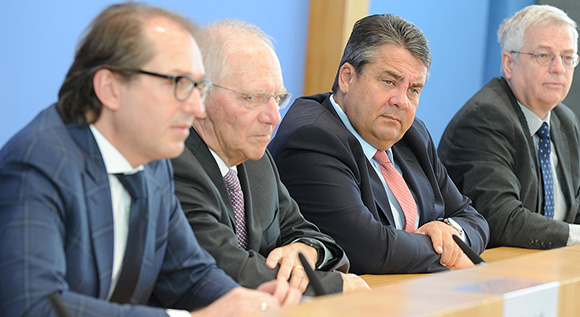Priority for electric vehicles
A boost for electric mobility - buyers of electric cars to receive 4,000 euros.
 From left to right: Federal Ministers Alexander Dobrindt, Dr Wolfgang Schäuble and Sigmar Gabriel; chairman of the Federal Press Conference, Dr Gregor Mayntz © Federal Ministry for Economic Affairs and Energy / Susanne Eriksson
From left to right: Federal Ministers Alexander Dobrindt, Dr Wolfgang Schäuble and Sigmar Gabriel; chairman of the Federal Press Conference, Dr Gregor Mayntz © Federal Ministry for Economic Affairs and Energy / Susanne Eriksson
No matter where you go for your holidays, the chances are you will see a lot of German car brands. Will the same soon be true of electric cars?
There are obvious reasons why electric mobility is good for the climate and a useful component of our energy transition. Vehicles powered by wind or solar energy are virtually emissions-free. This is why the German government and the automotive industry have agreed to start rewarding those who want to switch to an electric vehicle. The idea is to usher in the age of electric mobility.
Up to 4,000 euros for a new electric vehicle
Soon, anyone who decides to buy an electric vehicle is to be given a strong reward in the form of a 4,000-euro purchase grant. This grant is to be available up to 2019 at the latest. The government and the automotive industry have agreed that they will be sharing the costs equally, paying 600 million euros each. But before that, the agreement will have to be adopted by the Federal Cabinet.
The preparations for this at the Federal Office for Economic Affairs and Export Control are going ahead at full speed.
Minister Gabriel: "A big step forward"
Speaking at a press conference after the agreement was reached, Federal Minister Gabriel called the decision "a big step forward".
Stimulating demand, getting the market off the ground
In addition to introducing the purchase grant, the German government wants to take a whole host of other measures to stimulate demand and get the market for electric mobility off the ground. One of these measures, which show just how serious the government is about promoting electric mobility, is to bring the share of electric vehicles in the government's fleet up to a minimum of 20 per cent. What is even more important, though, are the plans for improving the charging infrastructure. After all, chargers are a key prerequisite for electric mobility to be able to take off in our country.
Finding a charger for your electric vehicle will become much easier
At present, there are about 5,800 charging points in Germany that are accessible to the public. Berlin is in first place with around 433, followed by Stuttgart and Hamburg which have 370 and 203 charging points respectively. This is not enough, though. The government has therefore decided to expand the charging infrastructure across the country.
This decision is in line with the Charging Station Ordinance which has been in force since March this year. A second objective of this regulation is to ensure that charging electric vehicles becomes more convenient. Under the ordinance, all new charging points that are set up in Germany must be fitted with a plug that can be universally used across the entire EU. Up until now, different manufacturers have been using different plugs. This has meant that some charging points could only be used by holders of a customer card and has resulted in the billing process being overly complicated. The government wants this to change.
A great deal has been done at many different levels in recent years, to ensure that electric mobility gets off the ground. Electric vehicles registered before the end of 2015, for instance, were exempted from being subject to motor vehicle tax for ten years, rather than five. Dedicated parking spaces for electric vehicles have been created on many roads, and access rules relaxed.
In future, nobody will have to pay tax to his employer for recharging an electric vehicle. Under current rules, employees who charge their electric vehicle in the office car park, using electricity paid for by the employer, have to pay tax on this, because it is considered a financial advantage subject to taxation. The relevant provision is currently under revision. This is yet another change that is to make electric mobility an even more attractive choice.
Progress in research
The government wants electric mobility to become ever more advanced. This is why it will continue to provide funding for research and development in this field. This year alone, 210 million euros have been earmarked for this purpose. A key priority here is battery research. If we want the batteries of the future to be made in Germany, now is the time to set the course for this.
'E know-how showcases'
Starting in 2012, targeted work has been conducted in the 'showcase regions' in order to broaden and deepen Germany's expertise in the field of electric mobility. Where will electric vehicles get their energy from? What infrastructure is needed to deliver this energy? These are some of the questions that policy-makers, scientists and carmakers were seeking to answer.
More than 3,600 electric vehicles were deployed across the designated 'showcase regions' of Saxony-Bavaria, Berlin-Brandenburg, Baden-Württemberg, and Lower Saxony. Among the various ideas that were tested were dedicated fast lanes for electric bikes, driving schools teaching how to drive electric cars, repair garages for electric cars, and studies to assess needs of long-haul commuters. The findings from this work and some recommendations for action derived from it were presented to the public at the Electric Mobility Showcases Conference in mid-April, shortly before the government took the decision to introduce specific measures to promote electric mobility. The material is available at www.schaufenster-elektromobilitaet.org.

